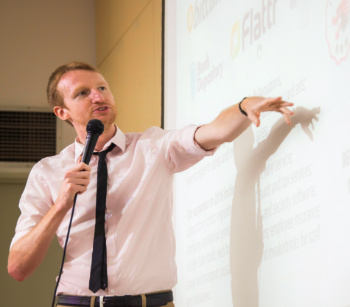
“When you become a journalist, nobody will like you because you’re disturbing them,” started Cedric Alviani, the director of Taipei bureau of Reporters Without Borders (RSF).
Cedric Alviani, Amin Iskandar, Tom Grundy and Kim Hye-kyung, four journalists defending the freedom of press, came to Ewha on April 26 to give a meaningful lecture to those dreaming of becoming journalists.
Alviani introduced RSF, an international non-profit organization supporting the freedom of media and information. He shared the current peril of the freedom of the press and what the organization is doing to protect this value. RSF publishes articles online on the situation of each country whenever a violation of the press takes place.
“We also carry out concrete actions by providing physical and online protections for journalists from the threats they receive due to their articles disclosing issues that specific groups prefer to hide,” Alviani said. “Physical protection is indeed important, but nowadays, online protection is also critical for journalists. It has become more important to protect their personal information to prevent cyber-attacks that threaten them.”
He continued by explaining the recent tendency of press freedom, expressing concern that global press freedom is now receding. Half of the world is committing extreme violations of press freedom, and western countries including the United States of America, which used to be a model for other countries, are regressing. China and Russia constructing new restrictions to the freedom of media and spreading them is another concern.
Amin Iskandar, a Malaysian journalist, introduced the situation in Malaysia. He shared how the Malaysian government is now suppressing the freedom of the press by passing anti-fake-news laws. Under these laws, all press reports that include information unverified by the government are to be considered fake news. The legislation is not only applied to the press within the country but also to foreign press and articles about Malaysia. Moreover, he shared his personal experience of being imprisoned in 2015 with his fellow journalists for writing articles that condemned the political situation in Malaysia.
“I was arrested simply because the government did not like what I wrote,” Iskandar said. “They even blocked the website, leading to the shutdown of the company. Rather than giving up, I started a new website, The Malaysian Insight, and our team is continuously fighting for press freedom in our country.”
Tom Grundy, who established Hong Kong Free Press (HKFP), a completely independent non-profit company that reports on issues in Hong Kong, suggested a new model for the press. He stated that China is taking over the freedom of the press in the country and how the media of the country is consciously and unconsciously selfcensoring and not reporting issues related to China.
Grundy introduced how he how he crowdfunded the money that was needed to establish his company, which is the first crowdfunded media outlet in the country. He showed the company’s transparency report, revealing where each donation was used in order to prompt more people to donate.
The three journalists took time for a Q&A session after the lecture. When asked about how they keep their news clear and accurate, Iskandar answered that they put accuracy before speed.
“Fact-checking should be considered primarily since it is extremely important to provide accurate news,” Iskandar said. “We publish collected evidence to prove that the news the government has produced is fake because otherwise the government would deny all the mistakes they’ve made later on, so, for journalists, we have to carry high responsibilities.”
Lastly, Alviani mentioned that Korea should not be satisfied with the current situation despite the improvements.
“We are aware that the political intervention from the past two presidencies was severely bad,” Cedric stated. “Korea has fixed the problems regarding the MBC and YTN issues, but the root of the problem is not yet fixed. Defamation laws are too strictly applied to journalists, which restricts them from producing real news. However, after the new administration, we noticed some hope since the government has shown its passion for the improvement of the situation. We hope Korea will continuously work for the freedom of the media.”

